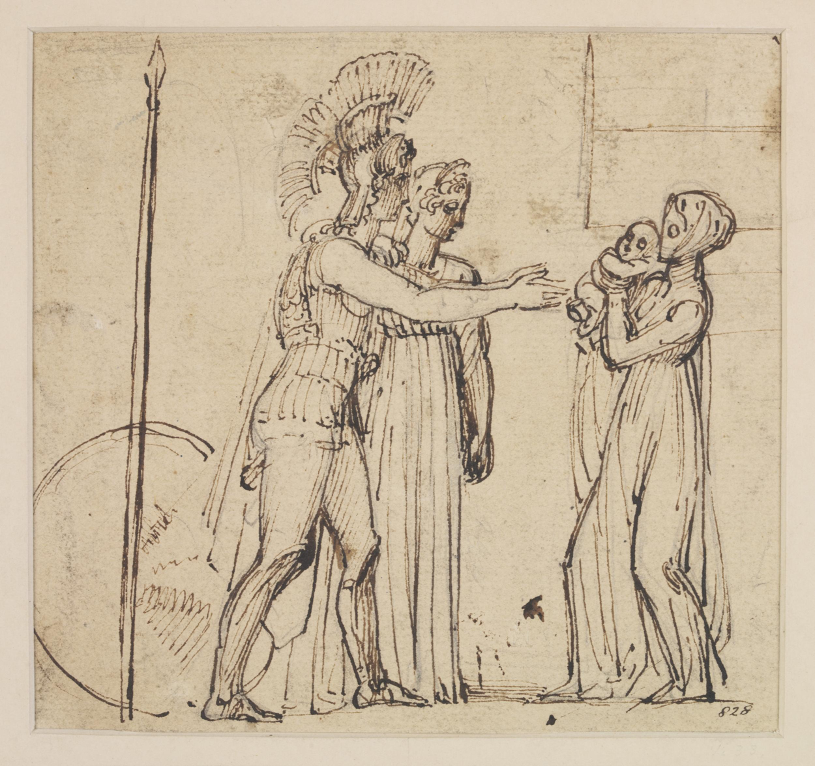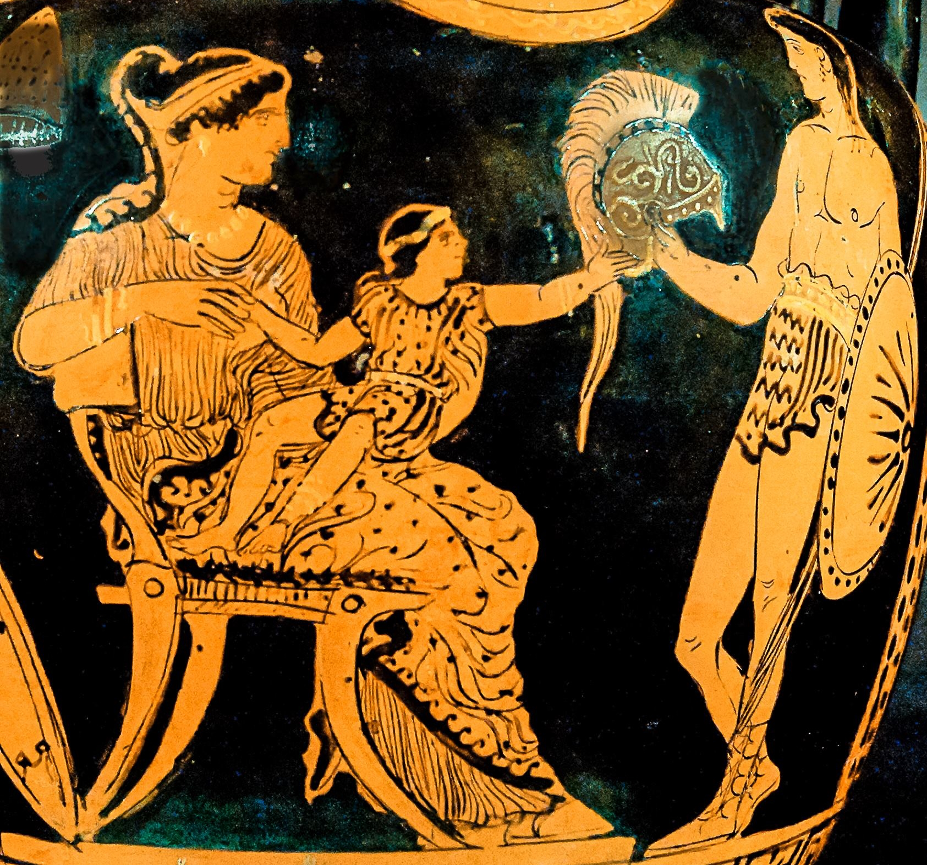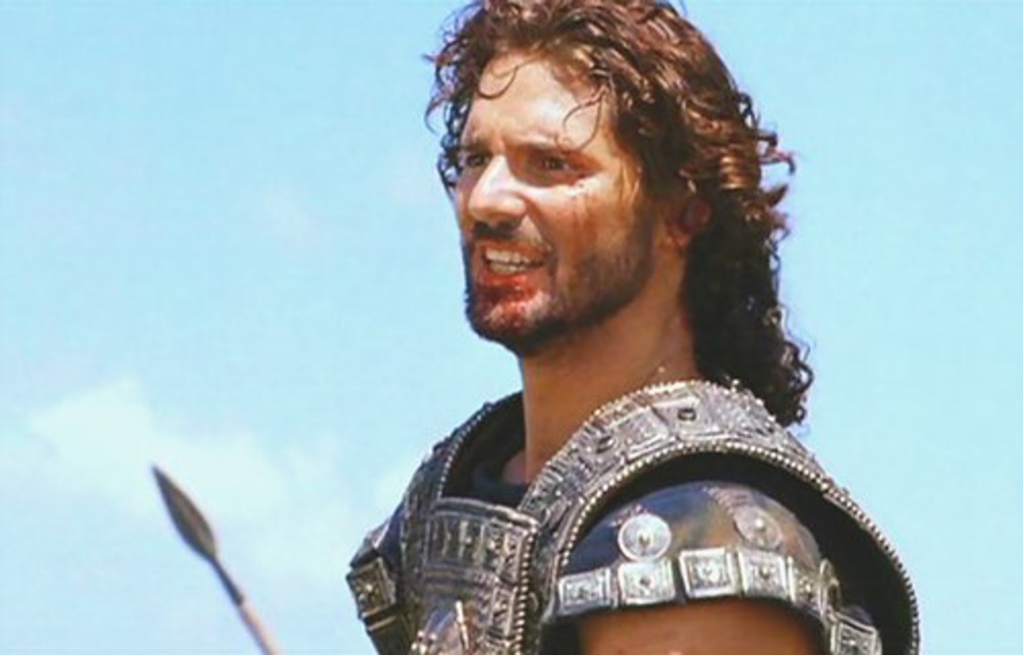Hector's farewell
(Poet's title: Hektors Abschied)
Set by Schubert:
D 312
[October 19, 1815]
Andromache:
Will sich Hektor ewig von mir wenden,
Wo Achill mit unnahbaren Händen
Dem Patroklus schrecklich Opfer bringt?
Wer wird künftig deinen Kleinen lehren
Speere werfen und die Götter ehren,
Wenn der finstre Orkus dich verschlingt?
Hektor:
Teures Weib, gebiete deinen Tränen,
Nach der Feldschlacht ist mein feurig Sehnen,
Diese Arme schützen Pergamos.
Kämpfend für den heil’gen Herd der Götter
Fall ich, und des Vaterlandes Retter
Steig ich nieder zu dem styg’schen Fluss.
Andromache:
Nimmer lausch ich deiner Waffen Schalle
Müßig liegt das Eisen in der Halle,
Priams großer Heldenstamm verdirbt;
Du wirst hingehn, wo kein Tag mehr scheinet,
Der Cocytus durch die Wüsten weinet,
Deine Lieb’ im Lethe stirbt.
Hektor:
All mein Sehnen will ich, all mein Denken,
In des Lethe stillen Strom versenken,
Aber meine Liebe nicht.
Horch, der Wilde tobt schon an den Mauern,
Gürte mir das Schwert um, lass das Trauern,
Hektors Liebe stirbt im Lethe nicht.
Andromache:
Is Hector going to turn away from me for ever,
While Achilles with his inaccessible hands
Offers up a terrible sacrifice to Patroclus?
In future who is going to teach your little ones
To throw spears and to venerate the gods,
When dark Orcus has engulfed you?
Hector:
Dear wife, control your tears!
It is my fiery longing to go onto the battlefield,
These arms protect Pergamos.
Battling for the sacred seat of the gods
Is how I shall fall, and it is as the saviour of the fatherland
That I shall climb down to the River Styx.
Andromache:
I shall no longer hear your weapons ringing out,
The iron is going to lie idle in the hallway,
Priam’s great tribe of heroes is about to be ruined.
You are going off to where no day will ever shine again,
Where Cocytus weeps through the wastelands and
Your body will die in Lethe.
Hector:
All my longing, all my thinking, I shall
Let them sink into Lethe’s quiet stream,
But not my love.
Listen! The madmen are already starting to rage by the walls,
Fasten the belt with my sword around me, stop mourning,
Hector’s love is not going to die in Lethe.
All translations into English that appear on this website, unless otherwise stated, are by Malcolm Wren. You are free to use them on condition that you acknowledge Malcolm Wren as the translator and schubertsong.uk as the source. Unless otherwise stated, the comments and essays that appear after the texts and translations are by Malcolm Wren and are © Copyright.
☙
Themes and images in this text:
The ancient world Husband and wife Iron Laments, elegies and mourning Lances and spears Lethe Longing and yearning Noise and silence Rivers (Strom) Swords and daggers Tears and crying The underworld (Orcus, Hades etc) War, battles and fighting Farewell and leave taking
Schiller’s verses are a distillation of a scene in Homer’s Iliad (Book VI). After years of siege the Greeks have begun a major assault on the city of Troy. Knowing that the fall of the city is imminent, Hector, the son of King Priam of Troy goes to look for his wife, Andromache:
Hector rushed from the house and re-traced his steps down the well-built streets. He had crossed the great city and had reached the Scaean Gate, by which he meant to go out on the plain, when Andromache herself, his richly dowered wife, came running up to meet him. Andromache was the daughter of the great-hearted Eëtion, the Cilician king, who lived below the wooded hill of Placus in Thebe-under-Placus. She came to meet her bronze-clad husband with a maid carrying a little boy in her arms, their baby son and Hector's darling, lovely as a star, whom Hector called Scamandrius, but the rest 'Astyanax', because his father was the one defence of Ilium. Hector looked at his son and smiled, but said nothing. Andromache, bursting into tears, went up to him and put her hand in his. 'Hector,' she said, 'you are possessed. This bravery of yours will be your end. You do not think of your little boy or your unhappy wife, whom you will make a widow soon. Some day the Achaeans are bound to kill you in a massed attack. And when I lose you I might as well be dead. There will be no comfort left, when you have met your doom - nothing but grief. I have no father, no mother, now. My father fell to the great Achilles when he sacked our lovely town, Cilician Thebe of the High Gates. But though Achilles killed Eëtion, he was too chivalrous to despoil him. He burnt him in his decorated arms and built a mound above him; and the mountain Nymphs, Daughters of aegis-bearing Zeus, planted elms around it. I had seven brothers too at home. In one day all of them went down to Hades' House. The great Achilles of the swift feet killed them all, among their shambling cattle and their white sheep. As for my mother, who was Queen in Thebe under the woods of Placus, Achilles brought her here with the rest of his spoils but freed her for a princely ransom, and she was killed by Artemis the Archeress in her father's house. 'So you, Hector, are father and mother and brother to me, as well as my beloved husband. Have pity on me now; stay here on the tower; and do not make your boy an orphan and your wife a widow. Rally the Trojans by the fig-tree there, where the wall is easiest to scale and the town most open to attack. Three times already, their best men, under the two Aiantes and the famous Idomeneus, the Atreidae and the formidable Diomedes, have assaulted that point and tried to break in. Someone who knows the oracles must have told them its history, or else they have their own reasons for attacking there.' 'All that, my dear,' said the great Hector of the glittering helmet, 'is surely my concern. But if I hid myself like a coward and refused to fight, I could never face the Trojans and the Trojan ladies in their trailing gowns. Besides, it would go against the grain, for I have trained myself always, like a good soldier, to take my place in the front line and win glory for my father and myself. Deep in my heart I know the day is coming when holy Ilium will be destroyed, with Priam and the people of Priam of the good ashen spear. Yet I am not so much distressed by the thought of what the Trojans will suffer, or Hecabe herself, or King Priam, or all my gallant brothers whom the enemy will fling down in the dust, as by the thought of you, dragged off in tears by some Achaean man-at-arms to slavery. I see you there in Argos, toiling for some other woman at the loom, or carrying water from an alien well, a helpless drudge with no will of your own. "There goes the wife of Hector," they will say when they see your tears. "He was the champion of the horse-taming Trojans when Ilium was besieged." And every time they say it, you will feel another pang at the loss of the one man who might have kept you free. Ah, may the earth lie deep on my dead body before I hear the screams you utter as they drag you off!' As he finished, glorious Hector held out his arms to take his boy. But the child shrank back with a cry to the bosom of his girdled nurse, alarmed by his father's appearance. He was frightened by the bronze of the helmet and the horsehair plume that he saw nodding grimly down at him. His father and his lady mother had to laugh. But noble Hector quickly took his helmet off and put the dazzling thing on the ground. Then he kissed his son, dandled him in his arms, and prayed to Zeus and the other gods: 'Zeus, and you other gods, grant that this boy of mine may be, like me, pre-eminent in Troy; as strong and brave as I; a mighty king of Ilium. May people say, when he comes back from battle, "Here is a better man than his father." Let him bring home the bloodstained armour of the enemy he has killed, and make his mother happy.' Hector handed the boy to his wife, who took him to her fragrant breast. She was smiling through her tears, and when her husband saw this he was moved. He stroked her with his hand and said: 'My dear, I beg you not to be too much distressed. No one is going to send me down to Hades before my proper time. But Fate is a thing that no man born of women, coward or hero, can escape. Go home now, and attend to your own work, the loom and the spindle, and see that the maidservants get on with theirs. War is men's business; and this war is the business of every man in Ilium, myself above all.' As he spoke, glorious Hector picked up his helmet with its horsehair plume, and his wife set out for home, shedding great tears and with many a backward look. from Homer, The Iliad Book VI English translation by E. V. Rieu 1950 (Penguin Classics)

Copyright: Victoria and Albert Museum, London
Schiller’s verses summarising the dialogue between the determined hero and his distraught wife first appeared in a scene in his ground-breaking play The Robbers. Here it is sung by Amalia von Edelreich, who is in love with her absent cousin Karl von Moor. Karl’s younger brother Franz is plotting to have Karl disinherited so that he can claim Amalia as his own, much against her will. She is reluctant to believe Franz’s claims that Karl has abandoned her and is living a disreputable life away from home. She recalls a scene in an arbour where they had sworn eternal devotion. The viewer is also aware that Franz’s latest underhand trick is about to be played on her: she and her uncle (Karl and Franz’s father) are about to receive a messenger telling them (wrongly) that Karl has been killed fighting in the Battle of Prague. She has clearly been thinking about her last meeting with Karl before he left home.
OLD MOOR: I am dying, and my son Karl is not here - I shall be carried to my grave, and he will not be at my grave to weep - how sweet it is to be lulled into the sleep of death by a son's prayer - it is like a lullaby. AMALIA: Yes, sweet as heaven it is, to be lulled into the sleep of death by a lover's song - perhaps we may dream on still in the grave - one long eternal never-ending dream of Karl until the bell tolls for the day of resurrection [leaping to her feet in ecstasy] - and from that moment on, in his arms for ever. [Pause. She goes to the keyboard, and plays.] Hector, wilt thou bid farewell for ever, Now Achilles with his murd'rous quiver Fearful vengeance for Patroclus swears? Who will teach thy tender son to fight, To cast his spear, and fear the Gods of right, When thy corpse grim Xanthus downward bears? OLD MOOR: A beautiful song, my daughter. You must play it for me before I die. AMALIA: It is the farewell of Andromache and Hector - Karl and I have often sung it to the lute together. [Continuing] Dearest wife, go, fetch the fateful lance, Let me go to tread war's horrid dance, On my back the weight of Ilium; The Gods shield Astyanax with their hand! Hector falls, to save his fatherland, We shall greet each other in Elysium. [Enter DANIEL.] DANIEL: There is a man waiting for you outside. He asks to be allowed to see you, he says he has an important piece of news for you. OLD MOOR: Only one thing in the world is important to me, you know what that is, Amalia - is it a man fallen on ill-luck, who has need of help from me? He shall not go sighing on his way. AMALIA: If it is a beggar, make haste and send him up. [Exit DANIEL.] AMALIA [continuing to play]: Never shall I hear thy weapons sing, In thy hall thy arms lie mouldering; Priam's race of heroes is passed by! Thou are gone where never daylight gleams, Where Cocytus through the desert streams, In dread Lethe's flood thy love will die. All my thoughts, ambition's crown Shall dread Lethe's flood in blackness drown, But never yet my love! Hark now! at the walls, the wild one raving - Gird my sword about me, cease they grieving! Lethe shall not drown thy Hector's love! [Enter FRANZ, HERRMANN in disguise, DANIEL.] FRANZ: Here is the man. Terrible news, he says, awaits you. Can you bear to hear it? OLD MOOR: It can only be one thing. Come here, friend, and do not spare me! Schiller, The Robbers, from Act Two, Scene Two. English translation by F. J. Lamport 1979 (Penguin Classics)
Schiller would have expected his readers and the audiences at his play to understand the connection between Amalia and Andromache, and that she sees herself as the bereft wife of a hero who has to comfort herself with only the memory of love. However, many of us have not undergone the same sort of classical education that Schiller pre-supposed, so some of the references to people and places in the Trojan War are not as helpful to us when engaging with the text as they would have been in the late 18th century. The following Who’s Who and What’s What is intended to fill in some of the necessary background.
| Achilles | One of the leading Greek (=Achaean) warriors who besieged Troy (=Ilium). At the climax of the story in Homer’s Iliad, Achilles kills Hector in revenge for the death of Patroclus. |
| Patroclus | Friend of Achilles, killed by Hector when fighting in Achilles’ armour. |
| Orcus | In Roman mythology, a god of the underworld and, by extension, the underworld itself. This is the Latin version of the Greek ‘Hades’. |
| Pergamus | The citadel (the sacred centre) of the city of Troy. |
| River Styx | The boundary between Earth and the underworld (Hades) and one of up to nine rivers sometimes said to flow in the underworld. The adjective form is Stygian (‘Stygian gloom’). |
| Priam | Hector’s father, King of Troy. |
| Cocytus | One of the rivers of Hades, a tributary of the river Acheron. |
| Lethe | ‘a river in Hades whose water when drunk made the souls of the dead forget their life on earth. ORIGIN via Latin from Greek lethe ‘forgetfulness’ ‘ (from The New Oxford Dictionary of English 1998) |

When Andromache warns Hector of the risks of going into battle and predicts that Achilles will make an offering ‘for Patroclus’, Schiller’s readers knew that that is exactly how things turned out: Hector killed Patroclus and Achilles did indeed take a terrible revenge by killing Hector (and later dragging his dead body behind a chariot at Patroclus’ funeral). Hector’s response to her prediction is not to reassure her that it is all going to be fine (as many modern-day soldiers might). He agrees that he is going to die, though Schiller avoids Homer’s direct reference to fate; Hector is presented as making an active decision to accept the consequences of his duty. Notice how he does not ‘fall’ to his death; he ‘climbs down’ (energetically and determinedly) to the river Styx. Yes, he is going to the underworld, and everything about him will go into forgetfulness – all except his love. That can never be forgotten.

☙
Original Spelling and note on the text Hektors Abschied Andromache: Will sich Hektor ewig von mir wenden, Wo Achill mit unnahbaren Händen Dem Patroklus schrecklich Opfer bringt? Wer wird künftig deinen Kleinen lehren Speere werfen und die Götter ehren, Wenn der finstre Orkus dich verschlingt? Hektor: Theures Weib gebiete deinen Thränen! Nach der Feldschlacht ist mein feurig Sehnen, Diese Arme schützen Pergamos. Kämpfend für den heil'gen Herd der Götter Fall ich, und des Vaterlandes Retter Steig' ich nieder zu dem styg'schen Fluß. Andromache: Nimmer lausch' ich deiner Waffen Schalle Müßig liegt das1 Eisen in der Halle, Priams großer Heldenstamm verdirbt. Du wirst hingeh'n wo kein Tag mehr scheinet, Der Cocytus durch die Wüsten weinet, Deine Lieb' im Lethe stirbt. Hektor: All mein Sehnen will ich, all mein Denken, In des Lethe stillen Strom versenken, Aber meine Liebe nicht. Horch! der Wilde tobt schon an den Mauern, Gürte mir das Schwerdt um, laß das Trauern, Hektors Liebe stirbt im Lethe nicht. 1 Schubert changed 'dein' (your) to 'das' (the)
Confirmed by Peter Rastl with Schubert’s source, Friedrich Schillers sämmtliche Werke. Neunter Band. Enthält: Gedichte. Erster Theil. Wien, 1810. In Commission bey Anton Doll. [korrigierter Druck] pages 237-238;and with Gedichte von Friederich Schiller, Erster Theil, Leipzig, 1800, bey Siegfried Lebrecht Crusius, pages 301-302.
First published in a different version in “Die Räuber”, act 2, scene 2
To see an early edition of the text, go to page 237 [243 von 292] here: http://digital.onb.ac.at/OnbViewer/viewer.faces?doc=ABO_%2BZ207858202


